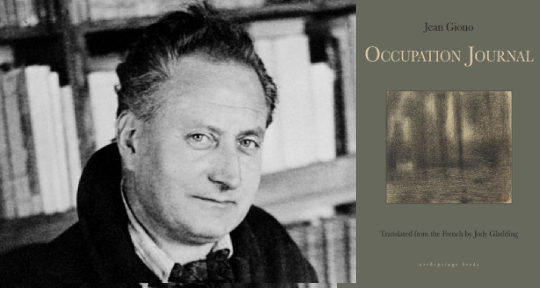Occupation Journal by Jean Giono, translated from the French by Jody Gladding, Archipelago Books, 2020
This is not a journal. It’s simply a tool of the trade. My life is not completely depicted. Nor would I want it to be. As I’ve said, here I practise scales, I break up my sentences, I try to stick as closely as possible to the truth. But sometimes events are so rich with drama or pathos . . . that practising scales—my scales— isn’t sufficient and I have to invent. For me, anyway, expressing truths of this order is impossible without inventing. Moreover, it’s to be able to express them simply that I force myself to do this daily work.
—Jean Giono, “December 25, Christmas”
In his own words, this book is an exercise: a series of attempts to train himself in writing, for when his “trade” is truly called upon. His goal? Simplicity and truth. Yet, reading this work in 2020, now available for the first time in English and translated by Jody Gladding, it is so much more than a mere exercise. Jean Giono’s Occupation Journal is a fascinating record of life under Nazi occupation in France, and an insight into the daily reading and writing practices of a dedicated author. Written between September 1943 and September 1944 whilst living in the town of Manosque in the south of France, it was only published in French in 1995 (by Gallimard, as Journal de l’Occupation). The diary entries are a fascinating historical record as well as immensely clever insights into the presence and importance of literature in a writer’s life.
By the time he began Occupation Journal, Giono was already a well-known writer, with over ten works published, including his famous “Pan trilogy.” He was also equally famous for his pacifism. Having been called up to fight on the frontline in WW1, Giono would never forget the horrors of his experience, and the resulting principles influence all of his early work. This journal, therefore, comes at a crucial time in his development; the majority of his work published after the war left behind pacifism, whose failure he witnessed in the coming of a second war, and adopted a greater pessimism with regards to human nature. Certain writers, including Stendhal and Balzac, also heavily impacted his later writing. This journal is a key into discovering this period of transition—a period so evidently crucial in the development of his thinking that its importance cannot be underestimated.
The infusion of literature into his daily living is remarkable. Giono notes profusely what he is reading, what he intends to read, and his reflections on what he has read. His reading is structured and often consists of long classics: Stendhal’s The Charterhouse of Parma, Balzac, Homer, Virgil. It’s almost enviable in its attention to detail and its scope—”I’ve read all of Proust carefully ten times”! Fascinatingly, he often views literature as a model, a possibility of this world, and he judges the world by the standards of those encountered in fiction. He views “nobility” and “grandeur,” for example, in terms of Lancelot and Don Quixote and applies this to war taking place in the “modern, mechanical world,” where, of course, society falls short:
But the quest for the Grail made the knights-errant gallop in a straight line. Even Don Quixote walks straight. Today it seems as though the Grail has shattered and they are chasing all the scattered bits of it in every direction.

